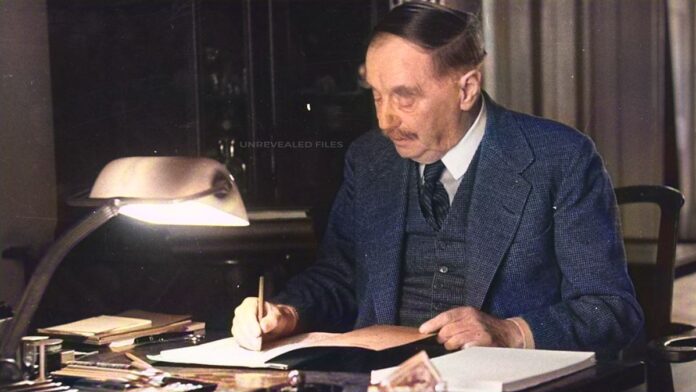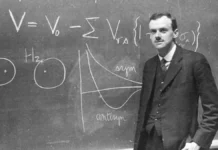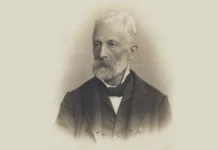
Herbert George Wells (H.G. Wells) was an English writer who excelled in many genres, including novels, short stories, social commentary, history, satire, biography, and autobiography. Apart from this, he has also written books on entertainment, war, and sports. However, he is most remembered in the modern era for his science fiction novels, and for that, he is often called the “father of science fiction” with Jules Verne and publisher Hugo Gernbach.
H.G. Wells was foremost a pioneer, even a future social critic, who devoted his literary talent to developing progressive vision globally. He was also a futurist, wrote many romantic works, and predicted the arrival of aircraft, tanks, space travel, nuclear weapons, satellite television, and the World Wide Web.
Contents
Born
H.G. Wells, full name Herbert George Wells, was born on September 21, 1866, at Atlas House, 162 High Street, Bromley, Kent. He was the fourth and last child of Joseph Wells, a former household gardener who was also a merchant and professional cricketer at the time, and Sarah Neal, a former domestic servant.
Early Life and Education of H.G. Wells
Wells family had inherited a business selling china and sporting goods, but it had failed to thrive since the product was old and worn out, and the location was terrible. Nevertheless, his father, Joseph Wells, managed to earn an insufficient living. However, most of it came from the business, and the rest came from playing professional cricket for Kent County.
Wells was from a lower-middle-class family, so he spent most of his time playing cricket and staying in his father’s small shop. Nevertheless, Wells received education in Physics, Chemistry, Biology, and Astronomy, among other subjects, securing a general school scholarship.
An accident in 1874 that left Wells bedridden with a fractured leg was a watershed moment in his life. To pass the time, he began reading books from the local library, which his father had brought him. He quickly grew enamored with the various worlds and lifestyles that books provided him; they also fueled his passion for writing. Later that year, he enrolled in Thomas Morley’s Commercial Academy, a private school formed in 1849 in the aftermath of Morley’s previous school’s bankruptcy.
The instruction was irregular, with the curriculum focusing primarily on generating copperplate handwriting and calculating the kinds of calculations essential to artisans, according to Wells afterward. Wells remained a student at Morley’s Academy until 1880. His father, Joseph Wells, broke his thigh in 1877. The accident effectively ended Joseph’s cricket career, and his subsequent earnings as a shopkeeper were insufficient to compensate for the loss of the family’s principal source of income.
Because they could no longer financially support, the family attempted to position their boys as apprentices in various vocations. As a result, Wells had an unsatisfactory apprenticeship as a draper at Hyde’s Drapery Emporium in Southsea from 1880 to 1883. His experiences at Hyde’s, where he worked a thirteen-hour day and slept in a dormitory with other apprentices, influenced his novels The Wheels of Chance, The History of Mr. Polly, and Kipps, which depict the life of a draper’s apprentice while also providing a critique of society’s wealth distribution.
Wells’s parents had a tumultuous marriage, owing primarily to his mother’s Protestantism and his father’s freethinking. When his mother returned to work as a lady’s maid (at Uppark, a country home in Sussex), one of the terms of her employment was that she would not be allowed to have living space for her husband and children. She and Joseph had different lives after that, yet they never divorced and remained committed to each other. As a result, Herbert’s problems worsened as he failed as a draper and, later, as a chemist’s assistant. Uppark, on the other hand, had a great library in which he absorbed himself, reading numerous famous books such as Plato’s Republic, Thomas More’s Utopia, and Daniel Defoe’s writings. This was the beginning of Wells’ literary career.
Later Life and Career
His science fiction stories included time travel, the invasion of Earth by alien beings, invisibility, and imagery of biological engineering. For Wells’s far-sighted thinking, Brian Aldis refers to Wells as the “Shakespeare of Science Fiction.” Wells rendered his works by establishing general elaboration with an extraordinary notion – called the “Rule of Wales” – led by Joseph Conrad in 1898 to call him “O Realist of the Fantastic!” where it went.
His most notable science fiction works include The Time Machine (1895), The Island of Doctor Moreau (1896), The Invisible Man (1897), The War of the Worlds (1898), and the military science fiction The War in the Air (1907). Wells was nominated four times for the Nobel Prize in his literature.
In the beginning, Wells was exceptionally trained in biology, so his thinking on ethical matters was in a particular and fundamental context of Darwinian. He was also an outspoken socialist from the earliest times and sympathetic to pacifist views. However, his later works became increasingly political and didactic, and he wrote very little science fiction. At the same time, he occasionally hinted at official documents, stating that his profession was that of a journalist.
Novels such as Kipps and The History of Mr. Polly, which describe lower-middle-class life, suggested that H.G. Wells was a worthy successor to Charles Dickens. Still, Wells talked about a range of social societies and even attempted to diagnose English society in Tono-Bungé (1909). In addition, Wells was a person with Diabetes and, in 1934, co-founded the charity The Diabetic Association (today known as Diabetes).
How did H.G. Wells Become a Pioneer of Science Fiction?
H.G. Wells, earned the title “Pioneer of Science Fiction,” with his groundbreaking novels, which include “The War of the Worlds,” “The Time Machine,” and “The Invisible Man,” these novels reshaped the science fiction genre’s landscape. These narratives spirited readers away on extraordinary odysseys through the dimensions of time, space, and the human psyche, all while exploring the repercussions of scientific advancement. Wells’ unique blend of scientific knowledge and captivating storytelling catapulted science fiction from the periphery of literature to a prestigious literary genre.
The idea of time travel existed in people’s thoughts and stories before H.G. Wells wrote “The Time Machine” in 1895. However, it was Wells’ book that made time travel really famous in science fiction.
Before Wells, there were stories like “Rip Van Winkle” by Washington Irving in 1819 and “Memoirs of the Twentieth Century” by Samuel Madden in 1733 that had some elements of time travel, where characters experienced time in unusual ways. But Wells was the first to come up with the idea of a machine that could take someone through time, and he thought deeply about what this could mean for science and philosophy.
Wells’ book got people very excited and made time travel a big deal in science fiction. Many other authors and later on, moviemakers, started to explore the idea of time travel in their own works. So, while people talked about time travel before Wells, it was during his time that it became really popular and an important part of science fiction storytelling.
H.G. Wells’ Prophetic Visionary
H.G. Wells has shown a near-supernatural capacity for future prediction. He predicted a Martian invasion with sophisticated weapons in “The War of the Worlds,” foreshadowing the development of modern military technology. His book “The World Set Free” hinted at the idea of atomic energy and ultimately paved the way for the creation of atomic weapons. Not only was Wells’s ability to see into the future a sign of his creative genius, but it also demonstrated his keen understanding of how science advances.
Social and Political Views
In his writings, H.G. Wells explored pressing social and political issues of his time, going beyond the surface-level appeal of adventure. “The Time Machine” explores the depths of social strata division and class conflict. “The War of the Worlds” is a mirror of human vulnerability and imperialist impulses. Wells uses his fiction as a contemplative tool, challenging readers to think through the possible consequences of their choices and deeds.
Died
H.G. Wells passed away on August 13, 1946, at the age of 79. He died at his home, which was located at 13 Hanover Terrace and had a view of Regent’s Park in London. The exact cause of his death remains unknown.
Wells had a unique request for his tombstone, as mentioned in the foreword to the 1941 edition of “The War in the Air.” He wanted it to read: “I warned you. You cursed knuckleheads.”
On August 16, 1946, his body was cremated at Golders Green Crematorium. Afterward, his ashes were scattered into the English Channel at a place called Old Harry Rocks, which is the farthest eastern point of the Jurassic Coast, about 3.5 miles (5.6 kilometers) from Swanage in Dorset.
Sources
- Wells, H. G. (2005) [1905]. Claeys, Gregory; Parrinder, Patrick (eds.). A Modern Utopia. Gregory Claeys, Francis Wheen, Andy Sawyer. Penguin Classics. ISBN 978-0-14-144112-2.
- “Wells, H. G.”. Revised May 18, 2015. The Encyclopedia of Science Fiction (SF-encyclopedia.com). Entry by ‘JC/BS’ John Clute and Brian Stableford.
- Adam Charles Roberts (2000), “The History of Science Fiction,” page 48. In Science Fiction, Routledge, ISBN 0-415-19204-8.
- “HG Wells: A visionary who should be remembered for his social predictions, not just his scientific ones.” The Independent.
- Wagar, W. Warren (2004). H. G. Wells: Traversing Time. Wesleyan University Press. p. 7.
- “How Hollywood fell for a British visionary.” The Telegraph. Archived from the original.
- “Nomination Database: Herbert G Wells.” Nobel Prize.org.
- Robert M. Philmus and David Y. Hughes, ed., H. G. Wells: Early Writings in Science and Science Fiction (Berkeley, Los Angeles, and London: University of California Press, 1975), p. 179.
- Vincent Brome, H. G. Wells: A Biography (London, New York, and Toronto: Longmans, Green, 1951).
- “H G Wells – Author, Historian, Teacher with Type 2 Diabetes”. www.diabetes.co.uk. January 15, 2019.
- Smith, David C. (1986) H. G. Wells: Desperately mortal. A biography. Yale University Press, New Haven and London ISBN 0-300-03672-8
- “September 21, 1866: Wells Springs Forth”. Wired.
- “HG Wells: prophet of free love.” The Guardian.
- Wells, Geoffrey H. (1925). The Works of H. G. Wells. London: Routledge. p. xvi. ISBN 0-86012-096-1. OCLC 458934085.
- Batchelor, John (1985). H. G. Wells. Cambridge, England: Cambridge University Press. p. 2. ISBN 0-521-27804-X.
- Pilkington, Ace G. (2017). Science Fiction and Futurism: Their Terms and Ideas. McFarland. p. 137.
FACT CHECK: We strive for accuracy and fairness. But if you see something that doesn’t look right, please Contact us.
DISCLOSURE: This Article may contain affiliate links and Sponsored ads, to know more please read our Privacy Policy.
Stay Updated: Follow our WhatsApp Channel and Telegram Channel.











